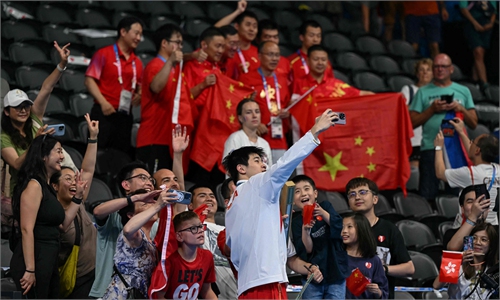China becomes pro in West’s game. How should West react?

Illustration: Xia Qing/GT
The Paris Olympics have ended, and we witnessed a nail-biter. Team USA and Team China ended up in a dead heat, each securing 40 gold medals. Talk about a photo finish!
This tie reflects the changing dynamics of global power. However, when discussing the geopolitical meaning of China's challenge, many Western analysts need to pay attention to one fact: China, adhering to the rulebook of the Olympic Games, is playing a game, the rules of which were written by the West.
Think about it. After World War II, when Uncle Sam and his European buddies were calling the shots, who would've thought that one day China would be going toe-to-toe with the US at the Olympics? For a long time, China wasn't even invited to the party. Now, China has become a heavyweight contender. The West wrote the rules, and China learned to play and is now a pro. That's going to ruffle some feathers among the old-timers.
On the Olympic stage, Chinese athletes fight for gold alongside their American counterparts. They're playing fair and square. They're training hard, competing honestly and following that "faster, higher, stronger - together" motto. Isn't that what the West has been preaching all along?
But when China starts bringing home the bacon, some Westerners get their knickers in a twist. Chinese swimmer Pan Zhanle, known as China's "flying fish," passed 21 drug tests from May to July and broke a world record during the competition. Yet an Australian coach questioned the achievement, saying that "it's not humanly possible."
This skepticism exposes the extreme bias some in the West have against global and human development. Their arrogance is built upon such biases. Facts are facts, and gold is gold, regardless of the color of the winner's skin; it doesn't lessen the weight of the gold medal. Sure, China has its "state-run system" approach to sports, but what nerve has that touched in the Americans? Has it broken any Olympic rules?
The New York Times (NYT) even published a piece asking if China's "state-run system" in sports has changed, which seems like an unnecessary worry. Instead, the NYT should explore three key questions to better understand China's growing influence on the global stage: Why do these established entities feel threatened by China's success and compliance with the rules they initially set? Can the existing systems accommodate China's rise? How might the West respond to China's rise, to ensure it can sustain its influence while still cooperating with China?
Overall, the content emphasizes the need for a deeper analysis of geopolitical power shifts and the implications for global governance.
History has a funny way of repeating itself. Once upon a time, the US was the new kid on the block, and Europe wasn't too thrilled about it. Now, it's China's turn in the spotlight.
Olympic medals are like a big pie - when someone gets a bigger slice, others get less. The global economy works the same way. The pie is getting bigger, and everyone still wants a bigger slice of it. We have to remember that the US and the West do not necessarily get a bigger share, even if the procedures and rules for dividing the pie are made by them.
Why shouldn't Chinese people stand on the podium? If you lose, you can catch up, but thinking that Chinese people shouldn't be up there and finding all sorts of reasons to obstruct Chinese athletes from competing is itself a disdain for rules and order.
The Paris Olympics might be over, but the competition between China and the US continues. Uncle Sam will keep throwing hurdles onto China's track. But can the US push China off the track? Fat chance! In the future, it is expected to see more Chinese athletes on those podiums at the Olympics.
China's rise isn't a threat - it's an opportunity. It's proof that human civilization can bloom in different ways. It can't be stopped.
The author is a senior editor with People's Daily, and currently a senior fellow with the Chongyang Institute for Financial Studies at Renmin University of China. dinggang@globaltimes.com.cn. Follow him on X @dinggangchina


